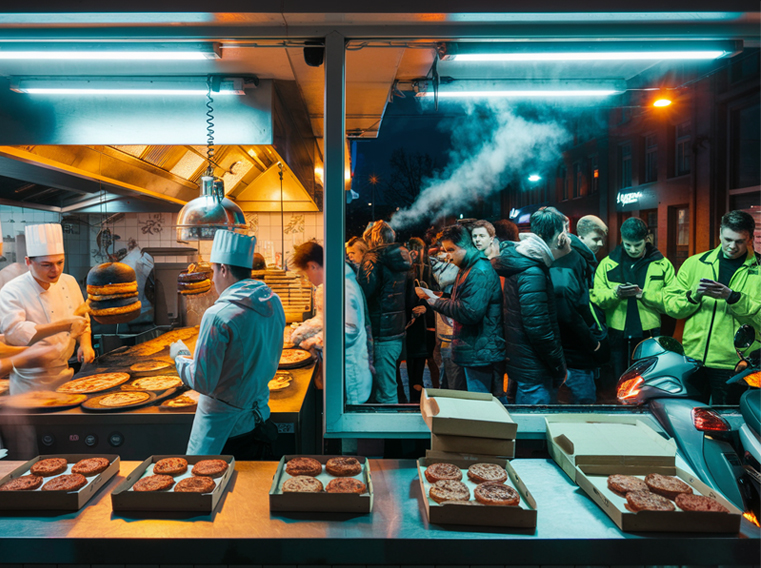From artisanal crepes to rebellious cheesecake waffles, Reading's breakfast rebels are transforming morning meals. These seven spots will revolutionize how you start your day.
A popular takeaway in Slough may soon cater to night owls and shift workers, as it seeks permission to serve food until 3am. The eatery, known for its diverse menu of pizzas, burgers, kebabs, and desserts, is pushing to extend its operating hours deep into the night. This move could transform the local late-night dining scene, potentially addressing the needs of Slough's 24-hour economy. However, the proposal raises questions about noise levels, community impact, and the changing face of urban nightlife in the Thames Valley region.
Slough Takeaway Seeks Extended Hours
A popular takeaway establishment in Slough is making waves with its application to extend operating hours until 3am. The eatery, known for its diverse menu featuring pizzas, burgers, kebabs, and desserts, aims to cater to the town's night owls and shift workers. This move could potentially reshape Slough's late-night dining landscape, addressing the needs of the area's growing 24-hour economy.
The takeaway, situated in the heart of Slough, currently closes earlier in the evening. If approved, the new hours would see the establishment serving hot food for an additional three to four hours each night. This extension could prove particularly beneficial for employees working non-traditional hours in sectors such as healthcare, transportation, and logistics, which have a significant presence in the Thames Valley region.
Local authorities are now tasked with weighing the potential benefits against any concerns. Key considerations include the impact on residential areas near the takeaway, potential increases in foot traffic during late hours, and the broader implications for Slough's nighttime economy. The council will likely scrutinise factors such as noise levels, waste management, and the establishment's track record in terms of customer behaviour and community relations.
Community Impact and Urban Development
The proposed extension of hours for this Slough takeaway reflects a broader trend in urban areas across the UK, where cities are adapting to changing work patterns and lifestyle preferences. This shift towards a more vibrant nighttime economy could bring both opportunities and challenges for Slough.
On the positive side, extended food service hours could enhance Slough's appeal to young professionals and potentially attract new businesses to the area. It may also provide additional employment opportunities, particularly for those seeking flexible working hours. Furthermore, a more active nighttime scene could contribute to the town's ongoing regeneration efforts, helping to shake off outdated perceptions of Slough as a purely commercial centre.
However, residents living near the takeaway may have valid concerns about increased noise, litter, and potential anti-social behaviour. The local council will need to balance these concerns with the potential economic benefits. Implementing strict conditions on the extended hours license, such as requirements for additional security measures or noise reduction strategies, could help mitigate negative impacts.
Comparisons could be drawn with other towns in the Thames Valley region, such as Reading or High Wycombe, which have successfully managed the expansion of their nighttime economies. Slough could potentially learn from these examples, implementing best practices to ensure that extended business hours contribute positively to the town's development without compromising residents' quality of life.
A New Dawn for Slough's Nightlife?

As Slough contemplates extending the operating hours of a popular takeaway until 3am, the town stands at a crossroads in its urban development. This seemingly modest proposal could herald a significant shift in Slough's nocturnal landscape, potentially transforming it from a quiet suburban enclave into a vibrant hub catering to night owls and shift workers alike.
The implications of this change stretch far beyond satisfying late-night cravings. It represents an opportunity for Slough to redefine its identity, attracting young professionals and diversifying its economy. However, this evolution comes with challenges, particularly in balancing the desires of businesses and night-time revellers with the concerns of local residents.
As Slough navigates this delicate balance, it has the chance to set a precedent for other towns in the Thames Valley region. By thoughtfully managing the expansion of its nighttime economy, Slough could emerge as a model of urban adaptation in the face of changing work patterns and lifestyle preferences.
The question now is: how will Slough's residents and policymakers shape this potential transformation? Will they embrace the change and work collaboratively to address concerns, or will resistance to change prevail? As Slough stands on the brink of this nocturnal revolution, its response could well determine the town's character for years to come.